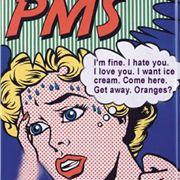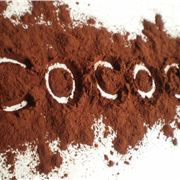UNFORTUNATELY, I’ve been plagued with hormonal problems for the whole of my fertile life. PMS sees me reaching for the biscuit tin, flying into a rage, curling up into a ball and sobbing on a regular basis.
 Sadly, the older I’ve got, the worse these symptoms have got. I’m now slowly entering the peri-menopausal phase of my life and am very aware that with that comes the prospect of even more hormonal ups and downs (the hot flushes have already started - eek).
Sadly, the older I’ve got, the worse these symptoms have got. I’m now slowly entering the peri-menopausal phase of my life and am very aware that with that comes the prospect of even more hormonal ups and downs (the hot flushes have already started - eek).
If like me, you play a monthly game of Russian roulette with your hormones, here are my top tips for balancing your hormones...
However, through lots of research and a process of trial and error, I’ve discovered there are a number of quite simple changes to diet and exercise that both you and I can implement to make a huge difference to the hormonal imbalance and positively impact on the quality of our daily life.
So, if like me, you play a monthly game of Russian roulette with your hormones, here are my top tips for balancing your hormones and alleviating the symptoms of PMS and peri-menopause:
1. Eat clean
Especially in the second half of your cycle (the ten days or so before your period), eliminating ‘toxic’ food substances such as dairy, wheat, sugar, alcohol and caffeine can significantly reduce PMS symptoms. Make sure your diet is full of nutrient rich fruit and vegetables, fat burning protein, and good fats such as olive and coconut oil.
2. Get moving
 If you’re craving foods or feeling a bit down in the dumps, get yourself off the sofa and do something physical. Firstly, it’ll take your mind off the craving, but even more importantly it’ll release the happy hormones (endorphins) that will help to lift your mood and make the toxic food less appealing.
If you’re craving foods or feeling a bit down in the dumps, get yourself off the sofa and do something physical. Firstly, it’ll take your mind off the craving, but even more importantly it’ll release the happy hormones (endorphins) that will help to lift your mood and make the toxic food less appealing.
Want to get more bang for your buck? Then exercise outside – the vitamin D from the sun’s rays (even on a cloudy day) will give you an extra mood boost. Don’t like traditional exercise classes and gyms? No problem. Ice skating, walking, rollerblading, mountaineering…the possibilities are endless.
3. Eat to relieve symptoms
There are foods out there that work as medicine for the relief and elimination of PMS and peri-menopausal symptoms.
Menstrual cramps can result from a lack of magnesium. Try packing your meals full of the following foods to boost your levels:
- Green leafy vegetables (especially spinach)
- Oily fish
- Almond and brazil nuts
- Seeds such as pumpkin and sunflower
- Black beans
 Food cravings can be minimised by using good quality cocoa powder mixed with water. This helps boost the happy hormones, the low levels of which are a major cause of food cravings.
Food cravings can be minimised by using good quality cocoa powder mixed with water. This helps boost the happy hormones, the low levels of which are a major cause of food cravings.
Hot flushes, mood swings and depression are all ways of your body ‘letting off steam’ and can be a sign that your oestrogen progesterone balance is out of whack (read my previous article peri-menopause and the muffin top for more information on this). Try boosting your progesterone levels by eating:
- Red, orange and yellow fruit and vegetables
- Ginger
- Turmeric, thyme and oregano
- Seeds and nuts
Also, make sure you avoid meat and dairy that contain hormones (eat organic) as these chemical hormones play havoc with your system.
4. Don’t sweat the small stuff
 Stress and anxiety can really mess with your hormones and heighten PMS symptoms so make sure engage in activities to help you relax. Try yoga and meditation, take a walk in the fresh air, practice Emotional Freedom Techniques (EFT), listen to music – whatever works for you. But most importantly, get good quality sleep. Winding down for bed by switching off TV and reading for half an hour or so before getting between 7 and 9 hours sleep in a cool dark room will help lower cortisol levels and alleviate stress.
Stress and anxiety can really mess with your hormones and heighten PMS symptoms so make sure engage in activities to help you relax. Try yoga and meditation, take a walk in the fresh air, practice Emotional Freedom Techniques (EFT), listen to music – whatever works for you. But most importantly, get good quality sleep. Winding down for bed by switching off TV and reading for half an hour or so before getting between 7 and 9 hours sleep in a cool dark room will help lower cortisol levels and alleviate stress.
5. Supplement your diet
If you’ve cleaned up your diet, lowered your stress levels and boosted your exercise but are still experiencing PMS and peri-menopausal symptoms there are a raft of supplements that you can try. There’s lots of conflicting information out there on the benefits or otherwise of various herbal supplements and obviously, if you’re considering a cocktail of supplements, I would always advise you to consult a qualified herbalist to get an accurate prescription. Ones that have worked for me include:
- Nettle tea to reduce bloating
- Ginger (taken as an infusion) to ease painful periods
- Sage (tea or tincture) for balancing oestrogen and progesterone levels to help balance moods
- B vitamins to balance moods
Sadly, there’s no miracle cure available, but hopefully implementing these small changes will help you (as they have me) to live a fitter, healthier and happier life.
Sara Perry is a Personal Trainer & Development Coach passionate about helping women over the age of 40 live fitter, happier and healthier lives.
For more information visit www.renaissance4women.com or email info@renaissance4women.com
Follow Sara on Twitter @renaissance4w









